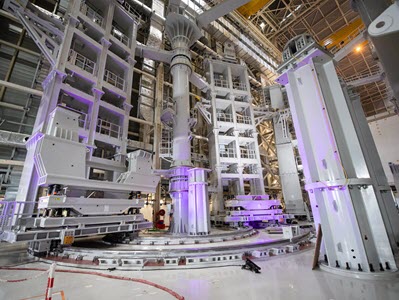South Korea's Nuclear Choices
Between Energy Security and National Security
James E. Platte argues that pursuing nuclear weapons likely would disrupt South Korea’s relations with international partners, threatening Seoul’s supply of enriched uranium, presenting legal problems to APR1400 construction projects, and challenging its ability to meet targets for domestic nuclear power production and reactor exports. This commentary is part of the roundtable Nuclear Armament Discourse in the Republic of Korea.
South Korea has been a lingering nuclear proliferation concern since the revelation of its secret nuclear weapons program in the 1970s. The United States’ diplomatic pressure then, including threats of suspending civil nuclear assistance to South Korea’s nuclear power sector, and reassurance of the U.S. security commitment to South Korea in the early 1980s helped end that proliferation threat.
South Korea has changed much since the 1970s. The government has become a vibrant democracy, and the economy has developed into one of the largest in the world, powered in part by world-class civilian nuclear energy technology. Yet Seoul’s nuclear choices remain an issue of concern, mostly due to the growing nuclear threat posed by North Korea. Congressional action through legislation and rhetoric could bolster South Korea’s peaceful use of nuclear energy and dampen proliferation desires.
Two developments in South Korea have reinvigorated the debate over its nuclear choices. The first development came with the election of Yoon Suk-yeol as president in March 2022. Yoon pledged during his presidential campaign to reverse the nuclear phase-out policy of his predecessor. His administration’s 10th Basic Plan for Electricity Supply and Demand set the target of increasing the share of nuclear power in the country’s electricity mix to be above 30% by 2030. The plan also called for South Korea to construct six new nuclear reactors by 2033 and export ten nuclear power plants by 2030, building off the construction of the Barakah nuclear power plant in the United Arab Emirates.
The second development has been statements by South Korean politicians suggesting that their country may need to develop its own nuclear weapons to counter North Korea’s nuclear threat. Public polling in recent years has suggested that a majority of South Koreans support pursuing nuclear weapons, and Yoon pledged during his presidential campaign that he would request the redeployment of U.S. nuclear weapons to South Korea. He reinforced this message in late 2022 by expressing a desire for NATO-style nuclear sharing with the United States and again in early 2023 by suggesting that South Korea may need to pursue its own nuclear deterrent. Seoul mayor Oh Se-hoon, a member of Yoon’s party and possible presidential contender in 2027, also voiced support recently for South Korea pursuing nuclear weapons.
Yoon’s promotion of nuclear power domestically and abroad is generally welcomed by Washington, but the second development clearly is of concern to U.S. policymakers. While the main intention of South Korean politicians’ statements on nuclear weapons may be to grab U.S. attention, the U.S. government must take these developments seriously. Both connections between these developments and lessons from the 1970s and 1980s offer opportunities for the U.S. government to influence Seoul’s nuclear calculus.
The most significant connection between these developments is that South Korea’s domestic nuclear power sector and reactor export projects still depend on international partners for key materials and technologies. Although South Korean firms are mostly sufficient in designing, building, operating, and servicing nuclear reactors, they are completely dependent on international partners for supply of enriched uranium, partly due to restrictions in the current 123 Agreement that governs civil nuclear cooperation. In addition, U.S.-based Westinghouse claims patents on the APR1400, which is a reactor designed by the Korea Electric Power Company and is South Korea’s main export model. All three reactors under construction in South Korea are APR1400s. Pursuing nuclear weapons likely would disrupt relations with international partners, including the United States, which would threaten South Korea’s supply of enriched uranium, present legal problems to APR1400 construction projects, and challenge Seoul’s ability to meet targets for domestic nuclear power production and reactor exports.
Considering these factors and the history of nuclear relations between the United States and South Korea, Congress should take the following actions to keep Seoul’s nuclear calculus pointed toward energy security. First, it should work to position the United States as South Korea’s preferred supplier of enriched uranium. This will require a significant increase in U.S. enrichment capacity, and congressional funding for Department of Energy initiatives to develop new enrichment plants is vital. Moreover, South Korea should be encouraged to help finance or purchase U.S. enrichment capacity. This would help secure South Korea’s fuel supply and give the U.S. government significant leverage over Seoul’s future nuclear decision-making.
Second, Congress should fund Department of Defense and whole-of-government initiatives to assure South Korea of the U.S. commitment to its national security. Members of Congress can demonstrate their support by regularly meeting with South Korean officials. As in the 1970s and 1980s, these actions to influence and assure South Korea will help ensure that Seoul stays committed to the peaceful uses of nuclear energy.
James E. Platte is an Assistant Professor at the School of Advanced Military Studies.
The views expressed in this commentary are those of the author and do not necessarily reflect the official policy or position of the Department of the Army, the Department of Defense, or the U.S. government.



